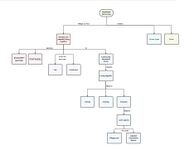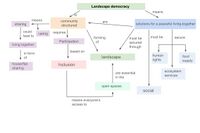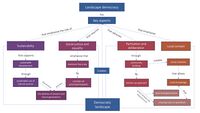Democratic Landscape Transformation 2024 - Team 4
>>> Back to working group overview
>>> Back to seminar reading list
>>> go to the Editing Help
Background of your team
Please present your team briefly. Which linguistic and cultural perspectives does each member bring in? Which disciplinary backgrounds are present in your team?
- Sonja (IMLA): I come from Germany and studied environmental sciences with a bachelor's degree. I am particularly interested in the inclusion of animals and their ecosystem services in the landscape transformation process. My manifesto is a video composed of some basic values and actions that I consider necessary for a demographic landscape change. It is not related to a specific place, but the images can have a focus on the European continent.
- Anna Borkó (MATE): I am Anna, from Hungary, I'm doing my master in landscape architecture at MATE. I am really interested in landscape studies, especially because of their diverse and complex nature. I am particularly interested in social aspects of landscapes, examining how people interact with and live in harmony with their environments. In this context I find the concept of landscape democracy really interesting and a great topic to deal with.
- Alicia Geier (IMLA): I come from Germany and studied landscape architecture with a bachelor's degree at Hochschule Geisenheim. Currently, I am continuing my studies in the IMLA program in Freising. It is very important to me to advance the emerging rethinking among landscape architects. In the past, planning was done more or less for the user; however, planning with the user brings more user engagement for the planned project and, in my opinion, increases the uniqueness of the project.
- Christina Gkoutzani (Athens)
- Sara Sarhan (UniBo)
Your Landscape Democracy Manifestoes
Here you can add links to the manifestoes you have presented on April 24. Please make sure that the links are accessible. You can also add them directly here on the wiki, they need to be png or jpg format then.
- Manifesto by Sonja: https://drive.google.com/file/d/1PGy6gXU6kkStKsxvWSM3744pGaltPivj/view?usp=drive_link
- Manifesto by Anna: https://docs.google.com/presentation/d/1dtpy2tflpP3n01N6zzKXFL8uFGFhjYs4/edit?usp=sharing&ouid=107267821770208720190&rtpof=true&sd=true
- Manifesto by Alicia:https://docs.google.com/presentation/d/18TLdyKsdu5ehimCyTF-Ob95gZpIywPsP/edit#slide=id.p1
Readings, concepts and definitions
- Start: April 3, 2024
- Due: July 2, 2024
While working in your group, please start to express your personal understanding of the relation of landscape and democracy in the form of a concept map with linking words or any other diagrammatic representation. Please make your maps very visual and not just verbal. Think critically about why one map differs from another.
The final product is a shared concept map that integrates the various understandings present within your team.
About concept mapping
Before starting the exercise you can read this article by Joseph D. Novak & Alberto J. Cañas about Theory Underlying Concept Maps and How to Construct and Use Them. This paper gives a good explanation of how concept maps are conceived and developed.
You can use any tool you like for producing your concept map. However, since the result needs to be submitted digitally we recommend the following open source software for producing your maps:
- Cmap Tools >>> you can also work with your group on the Cmap cloud doing a shared map
- VUE - The Visual Understanding Environment
- Use a shared whiteboard to develop your integrated concept map, such as MIRO or MURAL
How to present your concept maps
- Possible format: JPG (for wiki upload) or link to any other resource
- We give you below a draft image gallery where you can add pictures of your map (in JPG or PNG format)
- You can present your integrated understanding as one concept map or your present individual ones and the integrated one.
- add as many additional materials as you need
Overview of your concept maps (individiual and integrated)
Please finish with a short reflection
- What are the similarities and differences in your team regarding your understanding of what democratic landscape transformation is?
- We all think that participation is the base for democratic landscape transformation. there were different approaches and our group work brought local perspectives and global frame conditions together.
- In how far did the seminar lectures and readings help you to clarify this?
- The lectures gave a clearer understanding on Democracy in general. It gave inspiration how to connect it to landscape and that there are more ways of participation than we actually thought.
- What will you take home from this seminar?
- I'll take it from home out into the landscape ;) and be more aware of my opportunities to participate! Participation is the key factor for a change according to more human well-being and essential for a democratic landscape transformation.



